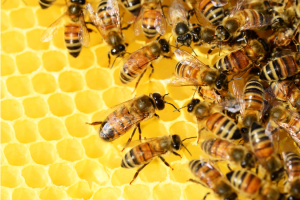
What gives honey immortal shelf life?
Years ago, archeologists found pots of honey, thousands of years old, when they excavated ancient Egyptian tombs. The honey had been preserved for over 3000 years. Recently, traces of honey was found in ceramic vessels inside some of Georgia’s tombs. The newly discovered traces of honey were 2,000 years older than those in the Egyptian tombs.
Egyptians believe that the bees’ sweet confection will give them a sweet transition into the afterlife. What gives honey immortal shelf life?
The answer lies in the chemical make-up of honey. Honey is a sugar, and like other sugars, it is hygroscopic. This means that it contains very little moisture naturally but can absorb moisture if left unsealed. The low moisture content of honey creates an inhospitable environment for bacteria and microorganisms, preventing their survival and growth.
Furthermore, honey’s natural acidity, with a pH between 3 and 4.5, acts as a deterrent for the growth of spoilage-causing organisms.
The process of honey production by bees also contributes to its resilience. Bees collect nectar, which contains 60 – 80% water, and then reduce its moisture content by flapping their wings. This behaviour effectively dries the water. Bees also possess an enzyme called glucose oxidase in their stomachs, which mixes with the nectar when they regurgitate it into the combs to make honey. This enzymatic action breaks down the nectar into gluconic acid and hydrogen peroxide, the latter of which possesses antibacterial properties, further inhibiting the growth of microorganisms.
The remarkable qualities of honey have been utilised for medicinal purposes throughout history. Honey’s thickness and antibacterial properties make it an effective barrier against infections when applied to wounds. Ancient Egyptians used honey regularly in medicinal treatments, including ointments for skin and eye diseases and as a natural bandage.
The spoilage of honey is primarily a result of exposure to air and water. Commercially processed honey is extensively heated, strained and filtered, and contains no particulates, making it less prone to crystallisation and spoilage. Properly sealed honey remains fresh indefinitely, but exposure to air or water can lead to spoilage.










